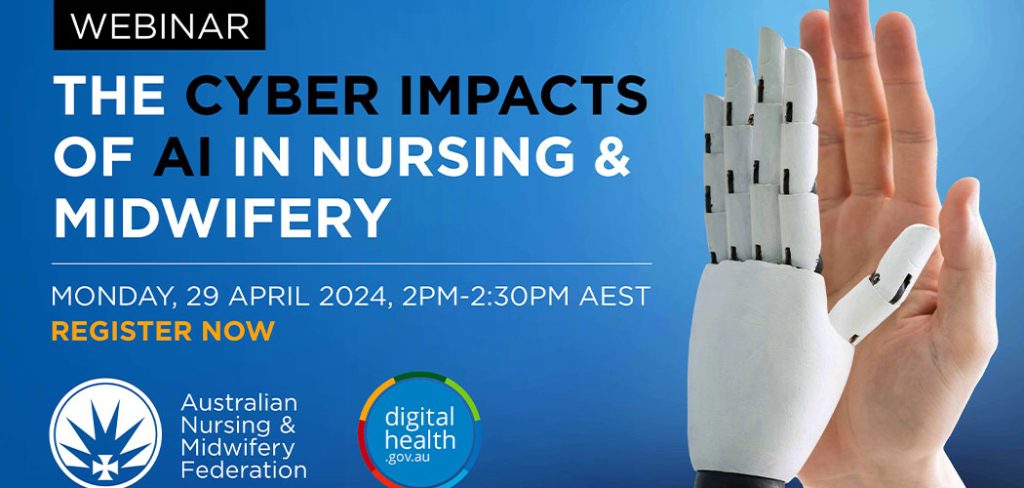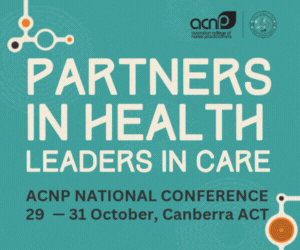As Artificial Intelligence (AI) tools become more widespread, particularly in sectors such as healthcare, the importance of cyber security protection measures will become even more paramount.
To help clinicians understand and adapt to the changing landscape, the ANMF and Australian Digital Health Agency (ADHA) are running a webinar later this month looking at what AI is and considerations for its use within nursing and midwifery, including ethical and privacy concerns regarding sensitive health information.
“We’re already using AI in so much of our daily lives that we often don’t even think about it,” explains webinar co-presenter Tracey Weeks, Manager Cyber Awareness and Education at the ADHA’s Cyber Security Branch, of how generative AI tools are changing society.
“Free tools such as ChatGPT have really brought AI technologies into the mainstream.
“Beyond ChatGPT, AI is all those technologies that can perform tasks that would normally require human intelligence. So, learning, thinking, applying reasoning to different problems and predicting outcomes. What we want to do in the session is give people a little bit of an understanding of the different types of AI they already engage with, whether it’s GPS, or even the emergence of driverless cars.”
Most importantly, the webinar will cover key considerations for using AI in nursing and midwifery and the importance of cyber security.
Key learning objectives
- What is Artificial Intelligence (AI)
- The ‘dark side’ of AI, such as phishing scams and cyber security threats
- Opportunities for AI in nursing and midwifery
- Cyber security considerations when using AI

Although the growing integration of AI in healthcare presents obvious risks, it also unlocks a world of opportunities for health professionals, including nurses and midwives, and the way they work, says webinar co-presenter Kym Clarke, Lead Officer Cyber Awareness & Education, at the ADHA’s Cyber Security Branch.
“AI relies on data and statistics,” she says.
“The opportunities [in healthcare] include precision medicine, streamlining of repetitive tasks, things that are based on data and algorithms that AI can perform. For example, it could enhance diagnostics, whether that’s medical imaging, or even just by having remote patient monitoring through wearable devices, AI could assist by collating data to assist in developing precise diagnostics and future care plans. Altogether, the hope is that it will improve patient outcomes and enable more time for direct patient care.”
On the flipside, nurses and midwives should be mindful and informed about which AI platforms they enter confidential information into to avoid potential negative consequences such as privacy breaches.
Undoubtedly, the biggest concern surrounding the growing use of AI in healthcare revolves around heightened cyber security vulnerabilities.
Ms Weeks, who refers to this threat as the ‘dark side of AI’, says the ADHA continues to educate healthcare organisations across the country about the importance of implementing cyber security protections.
“Ironically, these AI technologies are actually helping cyber criminals create a lot more polished and believable threats, such as polished phishing emails and even deepfake videos and imagery.”
“We’re going to provide some tips on how to question what you’re seeing now, as well as what you’re reading.”
According to Ms Clarke, AI is here to stay, and nurses should embrace it.
“Be part of the conversation so that the requirements for nurses and midwives are taken into consideration when building these products, so that they’ll serve the right purposes,” she encourages.
“AI does not empathise in the same way a human does, so nothing will ever replace the patient care that nurses and midwives deliver.”
Ms Weeks agrees, stressing that nurses and midwives shouldn’t feel worried about expanding digital technologies.
“AI has slowly been creeping in to our everyday lives,” she says.
“It’s something that won’t stop and it’s something we need to embrace. It’s all about taking responsibility for any systems we use and making sure we’re taking into account the right considerations. It’s going to have an amazing impact on the healthcare environment, so get on board with using the different technologies, but be aware of the cyber security issues around it.”
Webinar: The cyber impacts of AI in nursing and midwifery
Date: Monday, 29 April, 2-2:30pm (AEST)
Presenters: Tracey Weeks, Manager Cyber Awareness and Education, Kym Clarke Lead Cyber Awareness and Education Officer and Mark Sellwood Director Cyber Security Solutions, Cyber Security Branch.
Register for the webinar here








